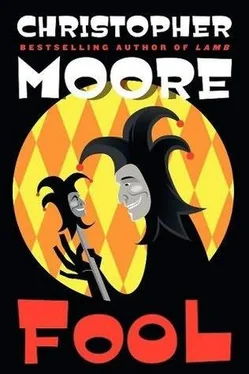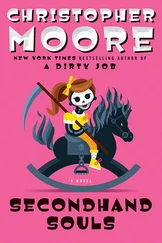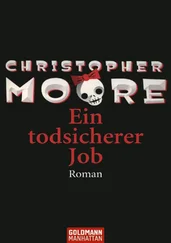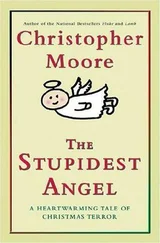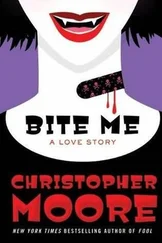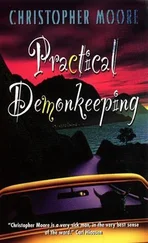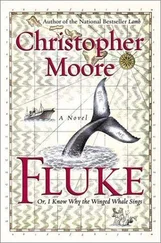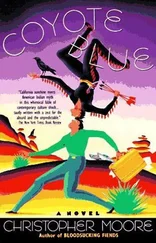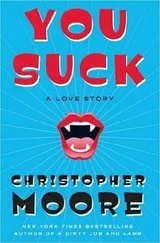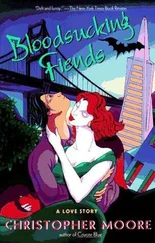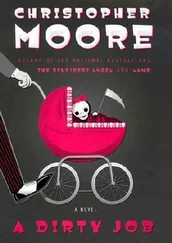“You’ve seen them?” He seemed strangely hopeful, as if I might have forgotten to bring the good news from his traitorous daughters.
“Seen them? I’ve shagged them.” Silly, really, that it should matter, after all his dark deeds, all his slights and cruelties, that a fool should shag his daughters, but it did matter, and it was a way to unleash a little of the fury I felt toward him.
“You have not,” said Lear.
“You have?” asked one of the guards.
I stood then, and strutted a bit for my audience, plus it was a better position for grinding my heel into Lear’s soul. All I could see was the water closing over my mother’s head, all I could hear was her screams as Lear held her. “I shagged them both, repeatedly, and with relish. Until they screamed, and begged and whimpered. I shagged them on the parapets overlooking the Thames, in the towers, under the table in the great hall, and once, I shagged Regan on a platter of pork in front of Muslims. I shagged Goneril in your own bed, in the chapel, and on your throne—which was her idea, by the way. I shagged them while servants watched and in case you were wondering, because they asked, and as any princess should be shagged, for the pure sweet nasty of it. And they—they did it because they hate you.”
Lear had been wailing while I ranted, trying to drown me out. Now he growled, “They do not. They love me all. They have said.”
“You murdered their mother, you decrepit loony! They’ve put you in a cell in your own dungeon. What do you need, a written decree? I tried to shag the hate out of them, nuncle, but some cures lie beyond a jester’s talents.”
“I wanted a son. Their mother would give me none.”
“I’m sure if they had known that they wouldn’t have despised you so deeply and done me so well.”
“My daughters wouldn’t have you. You didn’t have them.”
“Oh, I did, on my black heart’s blood, I did. And when it first started, each of them would shout Father when she came. I wonder why. Oh yes, nuncle, I did indeed. And they wanted you to know—that’s why they accused me before you. Oh yes, I bonked them both.”
“No,” wailed Lear.
“Me, too,” said Drool, with a great juicy grin. “Beggin’ your pardon,” he quickly added.
“But not today?” asked one of the guards. “Right?”
“No, not today, you bloody nitwit. Today I killed them.”
The French marched overland from the southeast and sailed ships up the Thames from the east. The lords of Surrey on the south showed no resistance and since Dover lay in the County of Kent, the forces of the banished earl not only offered no resistance, but joined the French in the assault on London. They’d marched and sailed across England without firing a single bolt or losing a single man. From the White Tower the guards could see the fires of the French drawing a great orange crescent in the night that illuminated the sky to the east and south.
When the captain made the call to arms at the castle, one of Lear’s old knights or squires, under the command of Captain Curan, put a blade to the throat of any of Edmund’s or Regan’s men, demanding they yield or die. The personal guard forces within the castle had all been drugged by the kitchen staff with some mysterious non-lethal poison that mimicked the symptoms of death.
Captain Curan sent a message to the Duke of Albany from the French queen that if he stood down, in fact, stood with her, that he could return to Albany with his forces, his lands, and his title intact. Goneril’s forces from Cornwall, and Edmund’s from Gloucester, camped on the west side of the Tower, found they were flanked on the south and east by the French, and on the north by Albany. Archers and crossbowmen were dispatched to the Tower walls above the Cornwall army and a herald fought his way through the panicked forces to a commander, carrying the message that the forces of Cornwall were to lay down their weapons on the spot or death would rain down upon them such as they could not imagine.
No one was willing to die for the cause of Edmund, bastard of Gloucester, or the dead Duke of Cornwall. They laid down their weapons and marched three leagues to the west as instructed.
In two hours it was all over. Out of nearly thirty thousand men who took the field at the White Tower, barely a dozen were killed—all of those, Edmund’s castle guards who refused to yield.
The four guards lay spread about the dungeon in various awkward positions, looking quite dead.
“Dodgy sodding poison,” said I. “Drool, see if you can reach the one with the keys.”
The Natural stretched through the bars, but the guard was too far away.
“I hope Curan knows we’re down here.”
Lear looked around wild-eyed again, as if his madness had returned. “What is this? Captain Curan is here? My knights?”
“Of course Curan is here. From the sound of the trumpets I’d say he’s taken the castle, as was the plan.”
“All your theater was misdirection, then?” said the king. “You’re not angry?”
“Burning, you old twat, but I was growing weary with keeping the tirade up while the bloody poison took hold. You’re no less a turd in the milk of human kindness than I have said.”
“No,” said the old man, as if my anger actually mattered to him. He began coughing again and caught a handful of blood for his effort. Drool propped him up and wiped his face. “I am king. I will not be judged by you, fool.”
“Not just a fool, nuncle. Your brother’s son. Did you have Kent murder him? The only decent bloke in your service and you turned him into an assassin, eh?”
“No, not Kent. It was another, not even a knight. A cutpurse who had come before the magistrate. It was he who Kent killed. I sent Kent after the assassin.”
“He is vexed by it still, Lear. Did you have a cutpurse kill your father as well?”
“My father was a leper and necromancer. I could not bear his misshapen form ruling Britain.”
“In your place, you mean?”
“Yes, in my place. Yes. But I did not send an assassin. He was in a cell at the temple at Bath. Out of the way, where no one might ever see him. But I could not take the throne until his death. I did not kill him, though. The priests there simply walled him up. Was time that killed my father.”
“You walled him up? Alive?” I was shaking now, I thought I might have forgiven the old man, seeing him suffer, but now I could hear my blood in my ears.
The sound of boots on stone echoed in the dungeon and I looked up to see the bastard Edmund walk into the torchlight.
He kicked one of the unconscious guards and looked at them like he’d just discovered monkey come in his Weetabix. [45] Weetabix—a British cereal biscuit whose taste and texture are generally thought to be improved by the addition of monkey come.
“Well, that’s a spot of bother, isn’t it?” he said. “I suppose I’ll have to kill you myself, then.” He stooped and took a crossbow from one of the guards’ back, fit his foot in the stirrup, and cocked the string.
INTERMISSION
(Backstage with the Players)
“Pocket, you rascal, you’ve trapped me in a comedy.”
“Well, for some, it is, yes.”
“When I saw the ghost I thought tragedy was assured.”
“Aye, there’s always a bloody ghost in a tragedy.”
“But the mistaken identity, the vulgarity, the lightness of theme and paucity of ideas, surely it’s a comedy. I’m not dressed for comedy, I’m all in black.”
“As am I, yet here we are.”
“So it is a comedy.”
“A black comedy—”
“I knew it.”
“For me, anyway.”
“Tragedy, then?”
“Bloody ghost is foreshadowing, innit?”
Читать дальше
